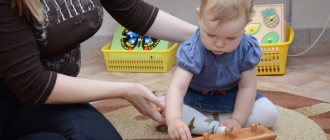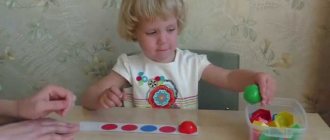Knowledge of foreign languages broadens your horizons and allows you to feel at home anywhere in the world. What parent doesn’t want their child to have developed intelligence and open doors everywhere? Therefore, children are increasingly being taught foreign languages from a very young age. It is believed that it is much easier for children to get used to a foreign culture than for an adult. But English for children requires a special teaching method, which we’ll talk about today. We'll tell you how to instill in your child an interest in learning and recommend ways to conduct English lessons for children easily and effectively. Let's get started!
At what age is it better for a child to start learning English?
As scientists have noted, the peculiarities of children's perception of the world help children learn foreign languages more easily. Children are open to everything new, and genuine curiosity drives them to learn more and more. The parent can only direct the child’s energy in the right direction. But the question of at what age should a child be taught English is very individual.
If we talk about the recommendations of specialists, their opinions also differ. Some scientists recommend conducting the first English lessons with a child from the age of 3. Other teachers advocate a more conscious age (5-6 years), and still others argue that before 7 you shouldn’t even think about foreign languages.
Each theory has its own arguments for and against, but we will not consider them in detail. In any case, only parents decide when to start learning English for their children. To make your choice easier, here are some tips.
- You should not start learning a second language until you have confidently mastered your native speech. This also applies to insufficient vocabulary, incorrect pronunciation, and violation of logical “object-designation” connections.
- If the child is not yet actively striving to explore the world, it is better to wait a while until the natural need to gain knowledge manifests itself.
- If, on the contrary, the child shows excessive activity, then you should definitely pay his attention to entertaining English lessons.
- Think about how psychologically you yourself should start learning English for your child. At the same time, parents must understand that their children are influenced by their own example. At a minimum, it is advisable that you know English at a beginner level or expand your knowledge with your children.
If you cannot make a decision, even after carefully weighing all the pros and cons, conduct a trial lesson with your child. If the baby doesn’t like it, then it’s not time yet. And if the child remains delighted, then all parental doubts will immediately disappear. Don't be afraid to try and don't rely too much on expert opinions. All people are individual, and it’s never too late to start learning.
Thus, we have theoretically figured out the age of young students. Now let's move on to more practical issues, and we will analyze in detail the methods and recommendations for teaching English to children of different ages.
General recommendations, literature
The variety of English lessons for kids is endless. Drawing and coloring, modeling, crafts, songs and dances, skits, active and role-playing games - all this can and should be organically included in classes. It is useful and fun for children to study in a group, but if you wish, it is easy to organize training for your child yourself at home. In this case, it is worth choosing a good textbook to rely on.
Experts recommend using textbooks by English-language authors, written entirely in English. Among them are guides for beginners - for example, the Activity Book for Children from Oxford, which contains several parts of a fascinating coloring book on which objects are labeled in a certain color. During the coloring process, the child will remember the names of the colors.
Picture Grammar for Children is another picture-based textbook. It is intended for children who have already passed the elementary level. Here, students are encouraged not only to memorize new words, but also to learn to write them, compose sentences from them, and answer questions. In an easy and unobtrusive form, the child will train oral speech skills, and this is exactly what is primarily meant by language proficiency. There are also excellent Russian-language textbooks and tutorials, for example, “English for Kids” edited by N. A. Bonk (authors I. A. Shishkova, M. E. Verbovskaya) . Equipped with interesting audio materials, it is perfect for working with children 4-6 years old.
The book “English for Children. Great tutorial" by Sergei Matveev . The information in it is presented clearly and in detail so that parents can easily work with their children on their own.
When deciding whether it is necessary to teach English to a child under 6-7 years old, it is worth considering that such classes will not only benefit him in preparation for school, but will also broaden his horizons and help him feel more confident in the company of his peers. You shouldn’t expect your child to speak English right away, but there is no doubt that the acquired knowledge will come in handy when learning the language at an older age.
English for children aged 3-4 years
This age is the most optimal if you decide to start learning English with your child from the cradle. During this period, children turn into active “why-whys” and they are interested in almost everything around them. At the same time, kids think in bright and simple images, which help them remember new information easily and quickly. Therefore, foreign language lessons for children aged 2.5 - 4 years old will certainly bear fruit. But it is very important to choose the right format for English classes for kids.
Where to begin
Little children are carefree and spontaneous, so there is no need to meticulously explain to them the rules of the language. English lessons for children should be held exclusively in a playful way: your child should not feel any moralizing, coercion or demands. With a forceful approach, you will not only teach your child nothing, but also, on the contrary, you will form a hateful attitude towards any foreign languages. Therefore, be very careful: it is better to have spontaneous lessons for 10-15 minutes in the form of a game than 30-minute lessons in the full sense of the word.
If we talk about where to start the process of learning English with children, then there are many options. Among them:
- Alphabet;
- Greeting phrases;
- Designations of family members;
- Numbers, colors, etc.
But again, don't expect strict and consistent training like adults. Try to offer topics that interest your child, for example, learning words about animals or colors in English together. Say a word, and let the baby repeat after you, or, for example, show a card with such a picture.
In general, the presentation of material should be very dynamic and varied. Don’t make your child get bored, let alone tired of long explanations. Try to use fun and playful methods to teach English to young children. We have listed some of them below.
Songs
Educational songs are one of the best ways to teach English to young children. Fun music quickly attracts children's attention and activates auditory memory. This is how the kids have fun and at the same time remember English vocabulary easily and quickly.
It is also very effective to include videos with songs for kids. A bright video illustrating the plot of the song will further attract attention and help engage visual memory in the work. And after a couple of training sessions, move on to performing songs on your own with your child. You can also add fun dancing or play with the images of objects/animals that are discussed in the song.
In general, such entertaining lessons will develop the following skills in children:
- Interest in learning foreign languages;
- Knowledge of English words;
- Ability to recognize English by ear;
- Ability to speak independently (repeating memorized phrases).
And, of course, the children’s memory functioning and general development of intelligence will improve.
Fairy tales
Another effective method with which you can effectively teach English to children under 7 years old. What child doesn’t love to hear about the adventures of fairy-tale characters, especially when mom or dad talk about them.
Read fairy tales to your child as you always do, only now slowly add elements of the English language to them. First, one or two words that are familiar to the child, and later try to study with adapted versions of English fairy tales. Be sure to read the texts playfully: with changing your voice, showing scenes, gestures, etc. The brighter the images, the more interesting it is for children.
Games
And the children’s favorite pastime is outdoor games, fun and logical guessing games. All these elements also need to be actively used when teaching English to children.
The simplest thing is to tell your child English words using educational cards. You show the card and the child names it (or vice versa). Another fun game: the parent portrays a fairy-tale character, animal, bird or object, and the child must name the hidden character in English. You can also just walk outside and name the colors of surrounding objects.
There are many options, the only thing I would like to note is that we would not recommend accustoming your child to electronic games at this age. Do not leave children's education to computers, tablets and other gadgets. Only by your own positive example and participation can you impart the best knowledge and skills into your child.
Recommendations for conducting classes and games
Despite the limited capabilities of preschoolers in mastering a foreign language, many teachers note that children who studied English at an early age master it more easily and successfully as part of the school curriculum. Not the least role in this is played by the positive attitude towards classes, formed in children thanks to the playful form of learning to which they are accustomed. Games in English lessons are also good because they can be not only educational, but also developmental.
Games with cards
Visual-figurative thinking, characteristic of children, makes cards with English letters, words, actions and objects written on them one of the most popular learning tools at all its stages. Here are just a few examples.
- “Name the picture.” This game is good for beginners: the teacher shows the children a card and names the animal drawn on it, for example a cat, and then passes it to one of the students. The guys take turns repeating the word “cat”, passing the picture to each other. This exercise allows all participants to practice pronunciation, and also creates a “success situation”, which psychologists consider very important for increasing motivation to learn. Over time, this game can become more difficult. For example, children can say not just “cat”, but “this is a cat” - the complexity of pronunciation increases, and the simplest grammatical structure appears.
- “Describe the picture.” At the next stage, you can give the task to each of the participants to add some suitable description to the word: “little cat”, “black cat”, “lazy cat” - of course, after studying the corresponding words.
- "What's missing?" You need to pin several cards on the board and ask the children to memorize them, and then have them close their eyes for a while. The presenter removes 1-2 pictures, after which the students remember and name the disappeared images. This game develops memory and attention.
Poems and songs
One of the best helpers in working with preschoolers is music. Children associate it with fun and strengthen their sympathy for the subject being studied. Simple poems and songs are easy to remember, help expand vocabulary and create a feeling of quick results: while reciting a rhyme, the child seems to already be speaking English, and this is much more interesting than simply repeating words or the alphabet. It motivates. In addition, poems often contain useful information: for example, about the seasons, days of the week, colors of the rainbow, numbers. There are songs with names of body parts or some physical actions - their performance must be accompanied by appropriate movements.
Cartoons and educational videos
A lesson in a group of preschoolers involves alternating several types of activities, since children cannot concentrate on any one task for more than 10-15 minutes. When inventing various games for them, one should not neglect the achievements of technological progress: educational cartoons in English will not only delight little students, but will also allow them to consolidate authentic sounds in their memory, learn new words and mechanically remember the rules for using grammatical structures, the essence of which they will comprehend through several years at school. After watching the video, it will be useful to arrange a short scene based on it, using the phrases and words heard in it.
Guessing Games
Asking questions and drawing logical conclusions from the answers is a useful exercise for children, even if it is done in their native language. During English classes, memory work is also connected to logical mental operations. You can guess animals, people, vegetables, fruits - all within the framework of the material covered.
In the game you can use not only different groups of objects, but also different grammatical entities.
- Third person - one of the players thinks of a vegetable, and the rest ask him questions: “is it red?”, “is it round?”, “is it a tomato?” When the item is guessed, the presenter gives an affirmative answer: “Yes, it is a tomato.”
- Second and first persons: “Are you a tomato?” - “Yes, I am a tomato.”
This way, children automatically learn grammatical patterns, which helps develop their ability to speak English rather than just memorizing individual words.
English for children 5-7 years old
Preschoolers have not yet lost their childish interest in the world around them, but they are already more serious than three- and four-year-olds. Therefore, many parents believe that this is the best age to start learning English. Lessons for preschool children are also conducted in a playful way and do not take much time, but the methods of learning English for preschool children are, naturally, slightly different.
Other English topics: Writing a story about your favorite toy in English - vocabulary, examples
Vocabulary
English lessons for children over 5 years old are always mostly about learning new words. English grammar is still too difficult for this age, and the letters are too simple. So this period is ideal for developing an active vocabulary in a child.
It is better for preschoolers to study vocabulary on certain topics. It would be good if these were vocabulary cards with bright pictures that reveal the meaning of the word. Firstly, a beautiful design in itself will attract children's attention, and secondly, with a picture the word is simply easier to remember. In addition, you can play exciting educational games with cards, but more on that later.
Vocabulary is also mastered in the process of studying children's rhymes, songs, and fairy tales.
Dialogues
To prevent your child from forgetting the vocabulary he has learned, add more English phrases to your conversations. For example, instead of good morning, say “Good morning my son (my daughter),” provoking the child to also answer in English. Of course, you shouldn’t go too far and constantly communicate in a foreign language. It is enough to use several popular phrases per day.
Also, English lessons for children 6 years old and older can be conducted by acting out small scenes. For example, you can use hand puppets and repeat the lines of characters from your favorite fairy tales. Or just play with dolls, making up a simple conversation:
- -Hello!
- -Hi!
- -My name is... etc.
It is advisable for the parent to say the line first, and the child to repeat after him, substituting the characteristics of his character.
Cartoons
First of all, foreign language classes should be interesting to the children themselves. And educational English cartoons will perfectly help parents in developing interest in learning in their preschoolers.
Play small colorful videos and watch them with your baby. Fortunately, today on the Internet you can easily find educational videos in English for children of any age. At the same time, it is not at all necessary to explain to the child in detail that we are not just watching a cartoon, but learning a new language. Give your child time, and he will become involved in the process and will be able to understand the simplest lines of the characters. Then it’s the parent’s job to do a short discussion after watching and consolidate the vocabulary heard.
With the right approach, such entertaining English lessons for children five to six years old are simply irreplaceable. After all, such activities arouse interest in the baby and help develop all the necessary speech skills:
- A set of new vocabulary;
- Understanding English by ear;
- Speaking (repetition of phrases + discussion with parents);
- Correct pronunciation.
In addition, this technique is very useful for general development, because cartoons reveal everyday moments and explain important life principles to children in an accessible form.
Games
As with small children, English for children 5 or 6 years old is always taught in a playful way. Therefore, organize various mini-games, contests or competitions more often.
So, with the help of cards you can play “guess the odd one out”: 3 cards on one topic are laid out, and a fourth is added from another deck. The child’s task is to remove the unnecessary card. There is an interesting variation of this memory game: 3-4 cards are laid out in a row, then the child closes his eyes, and the parents remove 1 card. The child must name exactly which card was removed.
You can also play with preschoolers “who knows more words”, “guess quickly”, “freeze sea figure”, “crocodile”, etc. The main thing is not to forget that victory and parental praise are very important for children. Therefore, speak kindly to your child more often, encourage him if he loses, and admire his successes when the baby wins. A warm attitude and interesting games, and even more so victories in them, motivate the child to study English more and more often.
This is how English is taught to children 7 years old. In fact, in preschool age children are just getting acquainted with the language, getting used to its sound and new words. But the role of such an easy game is very important: it liberates the children, and subsequently they will not have a language barrier, i.e. fear of speaking a foreign language. On the contrary, the second language will be perceived as a natural and necessary thing.
Benefits of teaching English to preschoolers
The practical benefits of knowing English are obvious, especially since, according to experts, any person, already knowing one or two languages, can learn an unlimited number of foreign dialects without extra effort. Psychologists and teachers favorably welcome the English language for preschool children as one of the ways to develop cognitive mental processes: thinking, memory, attention, speech. All these processes that determine a person’s intellectual characteristics are trained in the process of perceiving and assimilating new material.
The ability to memorize words or concepts that do not have the usual semantic associations and connections is a good exercise for memory. By memorizing unfamiliar words, the child builds new associative series, not just expands the variable series - he learns to look at the question differently, and, accordingly, to solve it in different ways. This flexibility of thinking is effective, applicable in almost all areas and will certainly be useful to a child who will soon change the status of a preschooler to a secondary school student.
The practical benefits of collective English classes are also noticeable in the process of a child’s adaptation to school. Since English classes for preschoolers take place in a small group of 4-6 people, they acquire communication skills in a pleasant playful environment. A child’s ability to differentiate information and think in two languages contributes to the plasticity of the psyche, the ability to adapt and find a common language in a team not only at the verbal, but also at the behavioral level.
English for younger students
And finally, the final period of childhood refers to elementary school. Here the parent’s task is to engage more with the child, explaining points that have not been considered in the school curriculum. At school, the teacher often does not have time to explain the lesson clearly, and a 1st grade student is not always able to concentrate and understand the material. Therefore, carefully monitor your child’s school progress and help him understand the curriculum.
In general, English for children aged 7-10 years is also partly taught in the format of a game, but with the active introduction of serious grammatical points. At this age, the conscious formation of language skills begins, so classes should be aimed at the comprehensive development of the child.
Reading
In our first English classes at school, we, of course, learn letters and their pronunciation. This level is necessary because not all children studied a foreign language before entering first grade. Then, according to the curriculum, there are reading rules, but in fact they are taught very crumpled, and children do not have time to fully master such an important topic. Therefore, this moment is filled in at home.
Carry out the training gradually, mastering no more than 1-2 rules per lesson with your child. Such small loads will not become an unbearable burden and, taking into account regular repetitions, will significantly improve the child’s English skills. On weekends, improve your reading skills with short, adapted texts for primary school-aged children. They will help you consolidate the rules you’ve learned and get acquainted with new vocabulary.
Dialogues
It's no secret that a language was created to be spoken. Therefore, foreign speech must be constantly practiced in conversation.
Of course, for first-graders such a task will be too difficult, but for 2nd grade students, perhaps, they are already able to independently compose a sentence from several words. But remember that classes should not be forced: English for children aged 8 is still the same game. Therefore, just occasionally, depending on the child’s mood, exchange a couple of general phrases with him or play “name/describe the object.” For this game, knowledge of the simplest constructions is enough:
- It is a banana. This banana is yellow. I like it very much. And what is it? - This is a banana. This banana is yellow. I really like him. What is it?
Such a dialogue, with the proper level of preparation, is possible even for a 5-year-old child, let alone second graders. By the age of ten, children will be able to form common sentences and use basic English tenses.
Grammar
Learning the rules of grammar is the very moment when English for schoolchildren ceases to be an entertaining game. Most children find grammar difficult, which is due to short school lessons and not always clear explanations from teachers. Therefore, grammatical topics need to be intensively studied in home classes.
Other English topics: Pronouns in English for children: learning the language in pictures and images
English grammar for children 7-9 years old is taught in a semi-game form. The basic rule is briefly explained and then reinforced by reading short stories, speaking dialogues and doing exercises. At the same time, the material is presented in the most simplified form: children do not need to know exceptions and special cases at the initial stage, because unnecessary information will only confuse the child.
It is also recommended to use electronic materials to study grammar. These could be presentations, training videos, mini-games and tests. The more diverse the presentation of the topic, the more parts of the brain are involved in the work, and, accordingly, the material is easier for children to assimilate. The main thing to remember is that any rule must not only be learned, but also be able to be used in speech.
Tests
Junior schoolchildren also cannot do without tests to check the topics they have studied.
Children in grades 1-2 are usually given a short oral survey, which is not much different from a dialogue game. The guys also solve very easy tests. For children 9-10 years old, they give more difficult work: correct specially made mistakes, answer a question, make a proposal on their own. Tests are becoming more diverse; now tasks require not just choosing an answer, but supplementing it with your own words.
But starting from the age of 12 or even 11, when tenses and irregular verbs are actively being mastered, almost every lesson ends with tests. And this is the right approach, because... Every detail of theory learned must be practiced.
Children, of course, perceive checks without enthusiasm. But the parents’ task is to convince the child that he can easily cope with the tasks because he is smart and capable. Praise more often and be less strict with mistakes made. It is better to calmly explain where the child was wrong and do the work again later than to yell and develop a hatred of learning in children.
Games and websites
Everyone loves to have fun, so the gaming method is effective for children as young as 3 years old, as young as 9 years old, and even as young as 15-16. For younger groups, it is recommended to conduct more outdoor and oral games, and English for children from 10 years old can be diversified with the help of electronic games and applications. However, in moderation, a computer will not harm children.
| Services and programs for learning English with children | ||
| Name | Age | Description |
| English Conversation for Kids | from 4 years old | Mobile application with a convenient catalog of training videos on YouTube. |
| LearnEnglish Kids | from 5 years old | A site with educational materials for children and their caring parents. There are mini-games, videos, flashcards, quizzes, etc. |
| Lingualeo | from 6 years old | A popular English learning service for adults and children. Here you will find collections of vocabulary, educational videos and songs with subtitles, exercises for grammar and memorizing words. Children are invited to undergo training with a special course “for the little ones”. |
| InternetUrok.ru | from 8 years old | A site with video lessons, notes, exercises and tests according to the school curriculum. |
| Duolingo | from 8 years old | The service will teach you popular vocabulary and help you understand how to construct sentences from words. |
| Quizlet | from 10 years old | Program for learning words. Doesn't let you get bored, because... Various memorization techniques are used. |
Zaitsev's technique
The next common technique is that of Nikolai Zaitsev. Suitable for both toddlers and older preschoolers. To teach younger children, the teacher (or parents) give them specially designed blocks with syllables to form words with. Those. memorization occurs in a playful and visual form. The next level also uses cubes.
The main idea is to make the algorithm for constructing sentences in English clear and simple. For each member of a sentence there is a specific color, and the child, having memorized the order of colors, say, for negative sentences, trains to form words under dictation. This is not an easy task for children, but its effectiveness has been proven.
The methodology also includes various manuals and tables, thanks to which parents themselves can conduct lessons without any problems.





